- Home
- Joe McKinney
Apocalypse of the Dead - 02 Page 3
Apocalypse of the Dead - 02 Read online
Page 3
He felt so much rage.
Billy was twenty-five, halfway through an eight-month sentence for selling stolen property to undercover officers. Before that, he had done two months for car burglary, charges dismissed. And the year before that, he’d done three months, again for car burglary, and again with the charges ultimately dismissed. There had been other visits, too.
But this time was different.
This latest round of trouble had finally pissed his mom off to the point where she no longer asked for explanations or feigned credulity when he provided them unsolicited.
This time, he had finally hit bottom.
Beside him, Tommy Patmore sucked in a deep breath.
Billy leaned over and whispered, “You’re gonna unravel those pants you keep picking at ‘em.”
A murmur.
“What’d you say?”
“Be quiet.”
Tommy glanced furtively around the bus. No one was paying any attention to them.
Billy followed Tommy’s gaze and frowned. “What’s wrong with you?”
One more look around.
“Ray Bob Walker came to see me this morning before we left. They asked me if I wanted to join.”
Billy sighed inwardly. He’d been dreading this.
“And? What’d you say?”
Tommy looked at him. It was enough.
“Ah, Tommy, you gotta be shitting me. What were you thinking?”
“Be quiet, Billy. They’ll hear you.”
“Fuck them. Tommy, I told you those Aryan Brotherhood assholes will get you killed. Is that what you want? You know what those guys do. What the fuck’s wrong with you?”
“Be quiet,” Tommy said. “They’ll hear you.”
He looked around the bus again. Billy looked, too. He saw a lot of bald heads: a mixture of blacks and Mexicans and white guys. The Mexicans and the white guys all had prison tats on their necks. The white guys came in two body types. You had the big guys, stout, meaty, biker types. They tended to be the older ones, doing time for robbery or check kiting. Then you had the lean ones, wiry, wild-eyed. They were the loud ones, the meth heads, the fighters, the ones with something to prove.
Tommy is going to fit in well with the younger ones, Billy thought. He had the body type. He had the same desperate air about him, an urgent need to fit in somewhere, anywhere. But then, all the young white guys who joined the Aryan Brotherhood started out that way. They were all angry, frustrated, a little frightened to find themselves alone in a world that demanded so much and yet seemed to promise so little in return. The Aryan Brotherhood offered safety. It offered direction. It offered a society that gave its members rank and made them something special within their own little world. It offered an “us” and a “them.” For someone like Tommy Patmore, the appeal was irresistible.
But they hadn’t looked twice at Billy. With a last name like Kline, they all assumed Billy was Jewish. But if he was, his family had neglected to tell him about it. And yet his name was enough to brand him a Jew in the eyes of his fellow prisoners. It made him a sort of nonentity, a prisoner like the rest, yet distinct enough that he didn’t fall inside any of the racial lines that sharply divide all U.S. jails and prisons. At six-one and a hundred and ninety pounds, he was big enough and tough enough to stand in the no-man’s land between the gangs, but it was a precarious existence. He was always watching the man behind him, because that man could turn on him at a moment’s notice, and maintaining that nearly constant state of vigilance wore Billy down, exhausted him.
That was the big reason why he hated to see Tommy Patmore get sucked into the gangs. He liked Tommy. Now, Tommy was one more individual he’d have to watch out for.
“Just do me a favor, would you?” Billy said. “Do your time smart. If they try to talk you into hurting somebody, get the hell out. The last thing you want to do is spend the rest of your life in a state pen someplace.”
Tommy swallowed the lump in his throat. Then he looked down at his hands folded in his lap.
That was all Billy needed to see.
“Ah, Tommy, you are one dumb son of a bitch. What did you agree to do?”
“Please don’t say anything.”
“What are you going to do? Tell me.”
Tommy looked around, then folded down the waistband of his pants, exposing a five-inch-long piece of tin that had been hammered into a crude shank, some duct tape wrapped around the blunt end as a handle.
“They haven’t told me who yet.”
“Ah, Tommy. For Christ’s sake.”
“Don’t say anything, Billy. Please.”
“I won’t,” Billy said.
He looked away in disgust.
In his mind, he tried to wash his hands of Tommy Patmore, though it wasn’t as easy as it should have been.
They were pulling into Centennial Park. The Gulf of Mexico stretched out before them like a flat green sheet of cold pea soup. Gulls circled over the water, filling the morning air with noise. The smell of the ocean was thick and pungent and pleasant. Billy closed his eyes and breathed in deeply. For a moment, he imagined that all his problems were somewhere else.
But it was the last quiet moment he would ever know.
The driver parked the bus in the middle of a nearly empty parking lot, and things started to happen quickly after that.
Billy shuffled off the bus with the others.
A few of the men stretched.
A guard came by and collected their SID sheets, the 3 x 5 index cards that contained all their personal information and that they had to present to the guards every time they moved from one place to the next.
Billy and three of the others were pulled off the line and brought over to the equipment stand.
A guard handed Billy a canvas sack with a strap meant to go over one shoulder and a sawed-off broom handle with a dull, bent spike shoved into one end.
“Collection detail,” the guard said. “You’re with Carnot. Over there.”
Deputy Carnot, who the prisoners called Deputy Carenot because he didn’t seem to give a shit about anything except talking on his cell phone, waved his men over and pointed them toward a large plain of grass south of the parking lot. He didn’t even have to stop talking on the phone. Billy and the other members of the collection detail had all done this before. They knew the drill. Fan out. Fill your bag. Empty it into the garbage sacks brought up by the runners.
Billy worked steadily for the better part of an hour, going up and down the grassy expanse of Centennial Park, spearing trash, while the others went around emptying garbage cans into sacks and carting them off to a Dumpster that had been brought in for their use. It was easy work, mindless, and in his head he was drifting.
All that morning, the wind off the Gulf had been trying to clear the clouds from the sky, and it was finally starting to succeed. It was getting hot. Billy walked over to where Deputy Carnot was sitting in a lawn chair next to a yellow watercooler, talking on his cell phone.
“Hey, boss, you mind if I get a drink?”
Carnot gave him a frown and a dismissive wave of his hand. I don’t give a shit. Do what you need to do and lemme alone.
It sounded like he was talking to his girlfriend. Billy shook his head and smiled. Then he filled a paper snow cone cup with water and leaned on his trash spike while he drank it down in one quick gulp. It felt good going down, cold and clean.
He leaned down again for another drink, and that’s when he saw it.
He froze.
About a hundred feet away, DeShawn James, one of the younger black guys on the work crew, was wrestling with a heavy trash can, trying to pull it out of a wooden bin so he could empty it. Behind him, hugging a line of shrubs and coming up fast, was Tommy Patmore.
Billy could see the tin shank glinting in Tommy’s right hand.
Damn it, Tommy. You are one dumb son of a bitch.
Billy glanced at Carnot. The man was oblivious, still talking on his phone. No one else seemed to have noticed To
mmy making his move either, and that was good.
Billy filled his cup, stood, and looked away, anywhere but at what Tommy was doing.
And that’s when he saw the man coming down the sidewalk toward him. His right arm was dark with dried blood, but he was walking normally, which is why Billy didn’t clue in right away that he was looking at a zombie. Like everybody else, he had seen the news footage from Texas. He had seen the infected wading through the flooded streets of Houston, their movements jerky and uncoordinated. He had seen the fighting in San Antonio and Austin and Dallas. He had read about them in magazines and seen the public service announcements on TV, telling you what to do if you should ever encounter one of the infected. But none of that occurred to him just then. All he saw was a man who didn’t look right but who sent a shiver down his spine just the same.
It wasn’t until he saw the man’s milky eyes that everything clicked.
And then he knew what he was looking at.
“Hey, boss,” he said.
Carnot rolled his eyes up at Billy. What the fuck do you want?
Billy pointed at the approaching zombie with a nod of his chin.
Carnot looked over his shoulder, then did a double take. “Holy shit,” he said. He stood up and backed away from his lawn chair, still holding the cell phone to his ear.
The zombie stepped off the sidewalk and onto the grass. It raised its arms, its hands outstretched and clutching for them in a gesture of supplication that Billy found strangely funny.
But he stopped laughing when the zombie started to moan. When you do nothing but sit around the common room of a jail pod all day, you watch a lot of TV. He had heard that moan before, on the news. Once, he’d seen a news spot where hundreds of the things had been moving down a San Antonio street. The things had been packed in tightly. And even with the volume turned down and the other guys talking and laughing and making asses of themselves all around him, he could still feel the gooseflesh popping up on his arms. But seeing it on TV was nothing like hearing it in person. The real thing took his breath away.
“Shoot it,” he said to Carnot.
But Carnot just stood there, the phone still stuck to the side of his face.
“Hang up the fucking phone and shoot,” Billy said.
Carnot groaned. Then he seemed to find himself. He looked at the phone like he was surprised it was still there. Then he said, “Babe, I gotta go.”
He flipped the phone closed and slid it into his gun belt.
Then he pulled his gun.
“Sir, you need to stop.”
“He’s not gonna stop,” Billy said.
“Shut up,” Carnot snapped.
He raised his gun and pointed it at the zombie’s chest.
“Stop, police!” Carnot shouted.
The man lumbered forward.
“Jesus, Carnot, he’s not gonna stop. Fucking shoot him already.”
“Stop,” Carnot said. But his voice was barely a whisper. He lowered his gun, raised it again.
“Oh, for Christ’s sake,” Billy said. He stepped around Carnot with his trash spike raised like a javelin and jammed it into the zombie’s temple.
The zombie didn’t go down. It stayed on its feet and even turned a little toward Billy, its hands coming up to clutch at him. Grunting with the effort, Billy held on to the spike and worked it around inside the wound until the zombie’s arms dropped down to its sides and it sagged to the ground. Billy guided it down onto its back and then yanked his spike free.
“Holy shit,” Carnot said. “What the hell did you do?”
Your job, you idiot.
But he didn’t say that. His gaze went right past Carnot to the parking lot. Three more zombies were limping toward them. They looked different than the one Billy had just put down. They were shabbier. Their clothes were gray, filthy rags. Their faces were gaunt, smeared with blood. They looked like the zombies he had seen on the news, the ones inside the quarantine zone.
He heard moaning to his right and looked that way.
“What the hell?” he said.
There were two zombies there, a man and a young boy, their wrists tied together.
“Hey, boss,” he said. “We’re gonna need that pistol.”
“Yeah,” Carnot said.
But the deputy was shaking so badly he could barely point his gun at the approaching zombies, all of whom had started to moan loudly. The sound carried with disturbing clarity across the park. It seemed to be coming from everywhere at once.
“We have to get to high ground,” Billy said.
Carnot nodded, but didn’t move.
“Come on,” Billy said.
He grabbed the deputy by the shoulder and pulled him toward the bus. There was enough of a gap between the zombies that Billy thought they’d be able to make it at a brisk walk, but they hadn’t gone more than a few steps when one of the prisoners tumbled out of the bus doors and landed on his back in the parking lot. It looked like his throat had been torn out. One of the guards climbed down after him, his face and the front of his uniform soaked through with a reddish-brown stain.
“Get on your radio,” Billy said to Carnot. “Call for help.”
Carnot reached down to his belt and felt for where the radio should have been, but wasn’t. He looked back at the watercooler. Billy followed his gaze and saw the radio in the grass next to the lawn chair.
“For Christ’s sake,” Billy said.
One of the other prisoners was coming across the grass toward them. Most of his face was gone. Billy stared at the man. He’d heard the infected could ignore pain that would put an uninfected person over into unconsciousness. There were recorded instances of the infected walking around with their intestines hanging out of their bellies. But Billy hadn’t really believed those things until now. That man, his face had literally been chewed off. And he was still coming.
Billy looked around for a place to take cover. The news had said to seek the high ground, if possible. There was a gap between the approaching zombies and through it he saw a car parked off by itself.
“There,” he said to Carnot. “That car over there. Come on.”
They ran for it, Billy pulling Carnot along behind him. The car was a fairly new Buick in decent shape. It was empty, and Billy was glad for that. He jumped onto the roof, turned, and pulled Carnot up next to him. Then they got on the roof and stood side by side, watching the zombies getting closer.
“You’re gonna have to shoot,” Billy said.
Carnot raised his weapon. Billy watched him take aim at a man in running shorts and the remnants of a bloodstained white T-shirt.
“Shoot him,” Billy said.
Carnot fired. The bullet smacked into the man’s shoulder and spun him around, but it didn’t drop him. He turned back toward them and came on again.
“Head shots, damn it,” Billy said.
“I’m trying,” Carnot said. His voice was trembling.
He fired three more times and managed only one hit.
Within moments they were surrounded. Mangled hands clutched at their feet. The moaning was deafening. Carnot was shaking badly now. He was firing wildly, completely missing zombies that were less than three feet from the tip of his gun. Billy, meanwhile, was kicking at hands and spearing at faces, making his movements count.
He got one of the zombies in the forehead, and the man slumped forward onto his knees, his face pressed against the back driver’s-side window by the bodies pushing in from behind him. One of the zombies in the back managed to ramp up over the fallen zombie’s back and came up onto the roof.
Billy sidestepped around the zombie’s outstretched arms and pushed him down onto the trunk.
He heard a click.
Carnot was standing there, pointing his empty Glock at the zombies below him. The slide was locked back in the empty position.
“Goddamn it. Reload!”
Carnot pointed the empty pistol at another zombie and tried to pull the trigger.
“Reload your
fucking—”
But Billy didn’t get a chance to finish. Carnot vanished. It was like Wile E. Coyote in those old Road Runner cartoons. One second he was there; the next he was gone, his feet pulled out from underneath him. The back of Carnot’s head smacked against the edge of the roof with a sickening crunch and then they pulled him down to the ground.
As Billy watched, they swarmed Carnot, tearing at him with their teeth and their fingers.
His screams lasted only a moment.
Billy didn’t waste time watching Carnot twitching in his death throes. Instead, he jumped to the ground and ran for it. A few of the zombies tried to follow, but they were slow. Billy was able to weave through them easily. Once he created some distance, he stopped, caught his breath, and looked for an escape route.
There were, he guessed, maybe sixty or seventy of the zombies walking across the park. Most were close by, already in the parking lot. A few were crossing the street into the hotels and green belts opposite the park. In the distance, he could hear police sirens getting closer.
“Never thought I’d be happy to hear that,” he muttered.
Out of the corner of his eye he saw movement, a splash of orange coming around a line of shrubs.
It was Tommy Patmore. His arms and his stomach and his thighs were soaked with blood, but he didn’t look infected. He looked shell-shocked, confused. The shank was still in his hand.
From behind Tommy, one of the other prisoners was coming up fast. He was limping, a bad bite wound just below his knee, but he was still moving with frightening speed.
A fast mover, Billy thought. The articles he’d read had mentioned how some of the zombies, the ones who were in really good physical condition before they became infected, sometimes managed to maintain a measure of their former physical prowess when they turned. But the same article had also said that it took longer for those people to turn. They’d only been out about two hours. How had this happened so fast?

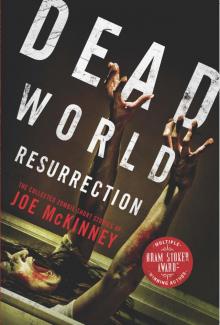 Dead World Resurrection
Dead World Resurrection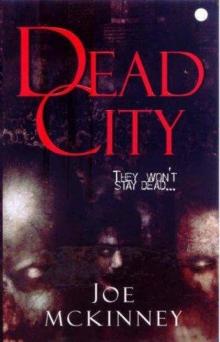 Dead City - 01
Dead City - 01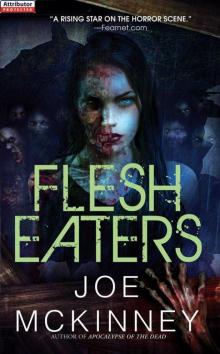 Flesh Eaters
Flesh Eaters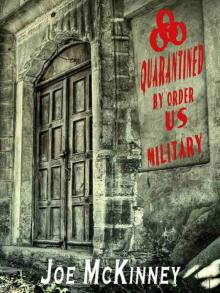 Quarantined
Quarantined Ultimate Undead Collection: The Zombie Apocalypse Best Sellers Boxed Set (10 Books)
Ultimate Undead Collection: The Zombie Apocalypse Best Sellers Boxed Set (10 Books)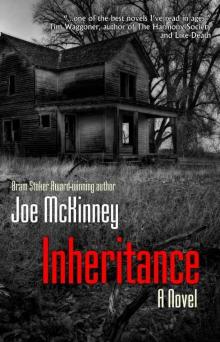 Inheritance
Inheritance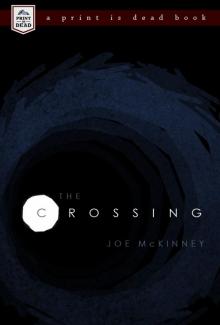 The Crossing: A Zombie Novella
The Crossing: A Zombie Novella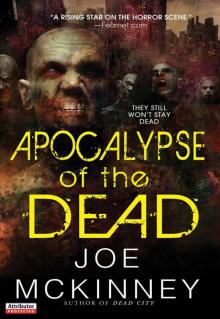 Apocalypse of the Dead
Apocalypse of the Dead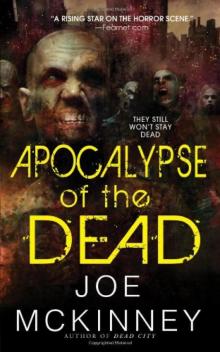 Apocalypse of the Dead - 02
Apocalypse of the Dead - 02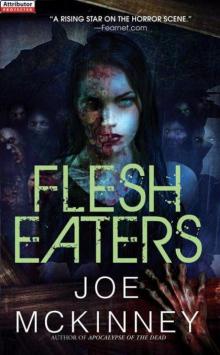 Flesh Eaters - 03
Flesh Eaters - 03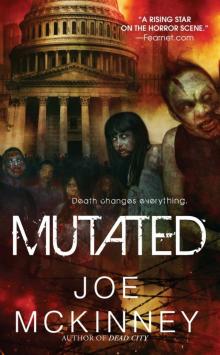 Mutated
Mutated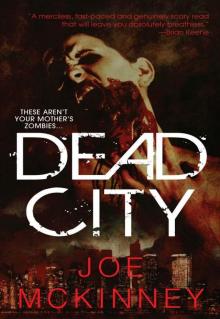 Dead City
Dead City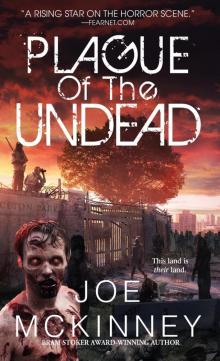 Plague of the Undead
Plague of the Undead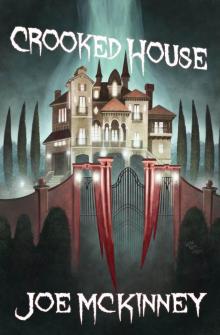 Crooked House
Crooked House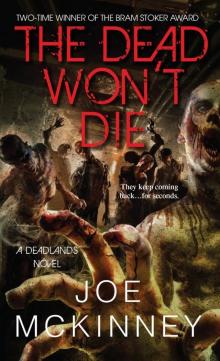 The Dead Won't Die
The Dead Won't Die